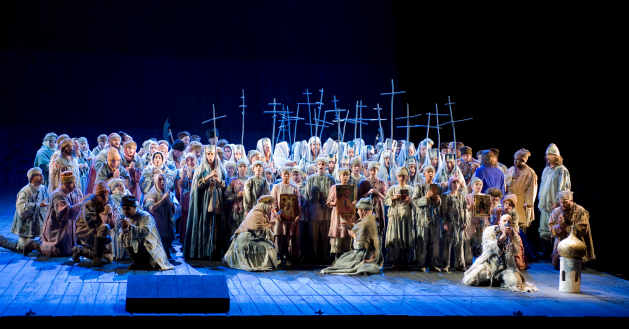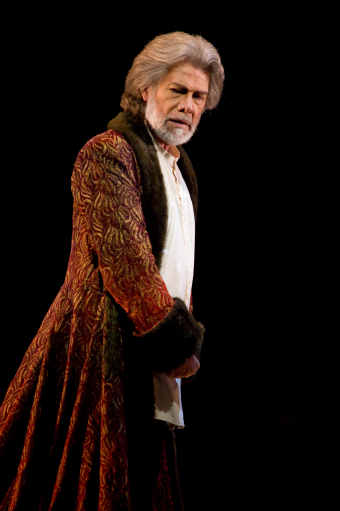Other Links
Editorial Board
- Editor - Bill Kenny
Founder - Len Mullenger
Google Site Search
SEEN
AND HEARD INTERNATIONAL OPERA REVIEW
Second Opinion.
Mussorgsky, Boris Godunov:
Soloists, Chorus and Orchestra of the San Francisco Opera,
Conductor, Vassily Sinaisky, War Memorial Opera House, San
Francisco. 2.11.2008 (HS)
Probably no other other opera has gone through as many revisions,
re-orchestrations, re-sorting of scenes and acts and other
adaptations than has Mussorgsky's Boris Godunov. Right from
the beginning, the composer himself went back to the drawing board.
The Imperial Theater rejected his original 1869 version, noting
among other things the lack of a significant female role. By 1872
the composer had reworked the seven existing scenes and added an
entirely new act set in Poland, where the princess Marina decides to
use a pretender to the throne as her path to becoming queen of
Russia.
Musically, Mussorgsky ends several scenes abruptly, the music
stopping suddenly rather than reaching a climax or arching into
rest. The curtain comes down for the one intermission at the end of
the scene at an inn, where the drunken friar Varlaam and his pal
Grigory, the pretender, are pursued by the tsar's guards. Despite
the vivacity and comic elements of the scene, it ends so
unpreparedly that only the drop of the curtain cued the audience to
applaud.
Boris Godunov – Samuel Ramey (bass-baritone)
Prince Shuisky -
John Uhlenhopp as Prince (tenor)
Grigory/The
Pretender Dimitri - Vsevolod Grivnov (tenor)
Varlaam - Vladimir Ognovenko (bass)
Pimen - Vitalij Kowaljow (bass)
The Simpleton - Andrew Bidlack (tenor)
Innkeeper: Catherine Cook (mezzo-soprano)

The Act I Set
The stark scenes in the original more single-mindedly focus on a
dark, brooding portrait of the troubled tsar than the grander, more
epic-scaled opera we are accustomed to. By the time the original
version finally was staged in 1928, several posthumous revisions,
culminating in a colorfully orchestrated one by Rimsky-Korsakov, had
changed Mussorgsky's tight, no-frills portrait into a grand opera.
This time around, San Francisco Opera mounted a strong, musically
and dramatically moving production of the original version, never
seen here. (In fact, Boris hasn't held the stage at SFO since James
Morris assayed the role in 1992.) One can argue that the later
versions are more complete, and the revisions to the original scenes
make them play more smoothly, but the original has a power of its
own: owing to a more economical palette of music and dramatic
material and that single-minded focus on what's going in in Boris'
mind without the distractions of colorful Polish balls and extensive
scenes detailing plots against him. Instead we can follow Boris'
disintegration from his accession to the throne through his growing
madness and eventual death.

Samuel Ramey as Boris
This economy, however, gives the scenes a certain realistic power,
the sense that we are encountering actual reality instead of a staging of
it. In its way, this series of individual moments is affecting. The
first two scenes, in later versions making up the prologue, show a
crowd of peasants being asked to pray that Boris will accept the
throne, followed by the coronation scene with the "slava" chorus and
Boris' prayer. Then we cut to the monk Pimen's cell, where he
recounts Boris' murder of the heir and Grigory decides to become the
pretender. Then comes the scene at the inn. After intermission we
get the scene in which Boris' monologue, wherein he sees the spectre
of the murdered heir, then the scene of in which a simpleton
confronts a frightened Boris, and the final scene of Boris'
confrontation with Pimen and his death. End of opera. No Polish act,
no Kromy Forest scene.
Some of the music we associate with Boris' big set-pieces had not
yet been written for this score. But Samuel Ramey, in the title
role, grabs hold of the material and gives us a portrait of a man
haunted by his past deeds (having killed the heir to get the throne)
and, in his dying moments, urges his son to keep his conscience
clear in order to be a good ruler. At 66, Ramey can occupy a
character with mesmerizing intensity and wield a gloriously dark
bass-baritone. The wobble that has affected him in recent years
stayed more or less in check in Sunday's performance, but a
prominent dynamic beat on the correct pitch, especially in his
mid-range, could be off-putting. At the top or the bottom, or in the
big moments, he can still pull it together to achieve astonishing
power.
The cast was strong across the board, both vocally and dramatically,
especially bass Vitalij Kowaljow as Pimen, bass Vladimir Ognovenko
as Varlaam and tenor Vsevolod Grivnov as Grigory, the pretender. As
The Simpleton, first-year Adler Fellow Andrew Bidlack appeared in
virtually every scene. Bald, cradling a model of an onion-domed
Kremlin tower, he roamed the stage, interacting mutely with other
characters, until encountering Boris in the penultimate scene. His
disturbing presence and clear, pure tenor made for strong theater.
Vassily Sinaisky, chief guest conductor of the BBC Philharmonic who
recently led performances of Carmen and Der Rosenkavalier
at English National Opera, was strongest in the more intimate
moments. The big crowd scenes never quite erupted with their full
power, possibly because Mussorgsky's own orchestration was less
colorful than the more familiar ones from Rimsky-Korsakov and
Shostakovich. That only put more emphasis on Boris' internal
struggles, which is exactly what made this version so compelling to
watch.
Harvey Steiman
Pictures © Terrence McCarthy
Back to Top Cumulative Index Page
